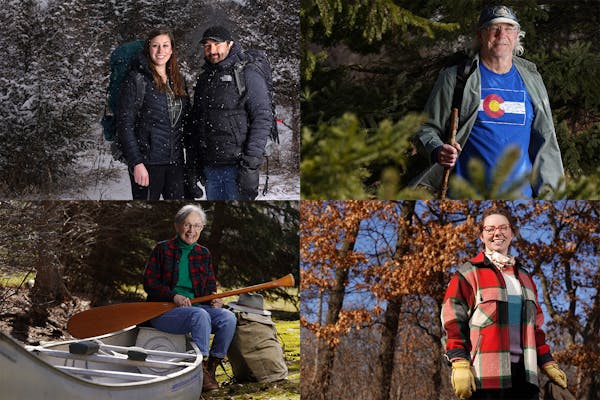In all manner of media, it seems the results are in: Time in nature makes us happier and healthier humans.
A simple Google search of four words — "spending time in nature" — will deliver a trove of research, from academic to personal, into nature's therapeutic effects.
Now a fledgling study through the University of Minnesota is hoping to add to the body of knowledge, starting with some questions that its researchers think haven't been fully answered:
Is there one type of experience that is more beneficial than another for most people? Closer to the point: Is one way to spend time in nature better than the next?
A pilot study is underway along Fish Lake Trail in the university's Cedar Creek Ecosystem Science Reserve in East Bethel, Minn., and the trails of Crosby Farm Regional Park along the Mississippi River in St. Paul.
Researchers have 40 adult participants. Each person will have four one-hour experiences on trails over the next several weeks. Three of the experiences are solo outings, each slightly different in how participants are engaged. For example, participants will have guided audio prompts using smartphones during one outing, and similar prompts but written for another. And one of the four experiences is a group hike led by a certified forest therapy guide.
Researchers will look closely at participants' responses before and after each experience to drill down on which of the four had the most benefit to the biggest number of people, said Erica Timko Olson, who is leading the pilot. Olson is a clinical assistant professor in the university's School of Nursing.
"We know time in nature is beneficial, but can we enhance that? Do people think a certain activity is better?" Olson said.
The pilot's approach is drawn from the well-documented — and publicized — regimen of shinrin-yoku, aka forest bathing, which surfaced in the 1980s as a tool in preventative health care in Japan. It involves immersive nature time, using the senses: Touch, sight, hearing, taste, and smell.
In the pilot, each outing will start with a land acknowledgment of the setting, at Crosby Farm, "the unceded land of the Dakota people."
What follows is "sensory meditation," said Kirsten Welge, a member of the research team and certified forest therapy guide. One 20-minute "invitation" is centered on presence and encourages getting comfortable and then looking at the landscape in all directions. What does the participant see? What is he or she drawn to? How does the body feel in the moment? What is good to the touch? What smells are in the air?
The outings conclude with a final prompt to close the experience with tea and reflection. In tone and intent, the emphasis on these experiences is to take things slowly.
Welge was led to the work from multiple channels: Through struggles with her own well-being; her professional background within the university's medical center, where she worked to improve care in specialty clinics; and, more recently, her 10-day canoe trip into the Boundary Waters Canoe Area Wilderness, which brought to mind the power of immersive experiences in nature.
"I tend to think about this from a public health perspective," she said, "easy, cheap, and effective interventions that will be applicable to the general population."
Mark Pereira, a university research professor in the Department of Epidemiology and Community Health and a mentor to Olson, welcomes the research — while he works on his own. He is trying to fund a study of his to expand on his earlier look at what happens to people in green spaces, such as a nature trail, vs. "gray" ones, such as walking on a busy street.
For all the media attention, he said nature therapy research has historically been low-funded and received little respect. It's an area that doesn't stand up to traditional scientific research, say, like that done on complementary medicine, where measures like dosage and effect are more precise.
Contributing to the barrier is a lack of rigorous science preceding what today is a steady drumbeat of recommendations for where, how and how much time people should spend in nature to reap the benefits.
"We don't have good answers to any of these questions: What happens to people's bodies and minds?" he said.
But Pereira is hopeful. A win is when he and others have work that informs policy and contributes to systemic change, he said.
"We hope to have answers someday," Pereira said. "[The research field] is growing. The science is evolving and getting more robust."
Olson is hoping this pilot and others she has directed, like that focused on nature's effect on young cancer patients, will support funding for a larger study, where what they've learned about their participants' experiences can get tested in a broader way. The end goal is what works and what doesn't, Olson and Welge said.
"All of these pilot studies are building toward that big branch," she said.
Samuel Dennis Jr. agrees. He is a professor of environmental design and landscape architecture at the University of Wisconsin-Madison, and he sees common roots in all the research.
"The research is now focusing on tweaking the experience and, more so, where those experiences occur," Dennis said. "How much green [space is needed]? How much gray? What counts as an effective experience?"
Climate change, the growth of American cities and urbanization and health inequities across race and ethnicity make the work even more urgent, he said.
Olson said the earth's health, too, is at stake and relevant in the university's research. People protect what they love.
"The key to having people invested in the health of our planet is to have them connected to the planet," Olson said, "and the more time you spend in nature, the more connected you are to nature."







